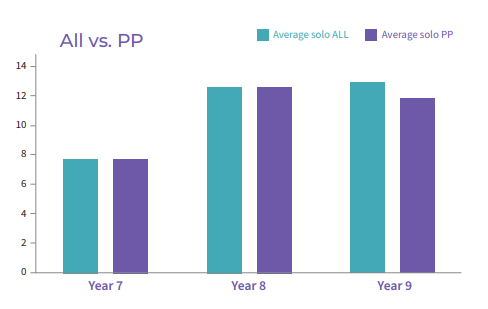
Year 7 and 8 students eligible for pupil premium in ‘MiSST schools’ are performing just as highly as their peers in music, the MiSST Annual Impact Report for 2020-2021 has found.
This contradicts the national trend reported by the Department for Education (DfE) in 2020, which is that the gap between disadvantaged students and their peers had increased for the second year running.
The MiSST report found that in Year 9, there is a ‘slight difference’ in performance (approximately one mark) between pupil premium students and non-pupil premium students, but that this is ‘minimal’.

Graph showing average attainment of all students vs pupil premium students in KS3 music - taken from MiSST annual report
To become a Music in Secondary Schools Trust partner school, or a MiSST school, a school must meet a number of indicators of deprivation and school leaders must demonstrate a commitment to using music as a ‘vehicle for transformation’.
Currently with 22 MiSST schools in and outside of London, the charity reports that it provides classical music opportunities to over 8,030 students.
Andrew Lloyd Webber Programme
The latest report highlights the Andrew Lloyd Webber Programme - MiSST’s KS3 curriculum - which is taught to every student in partner schools each week.
Yesterday, Lloyd Webber was quoted in the Guardian saying: ‘At a time when schools are so under pressure that music teaching is at serious risk, programmes like MiSST are needed more than ever before.’
Speaking about the need for increased funding for music education, he added: ‘[...] I’ve found, in dealing with this government, one’s been banging one’s head against a brick wall on so many issues – and this one is a no-brainer.’
The Andrew Lloyd Webber Foundation is one of MiSST’s main sponsors, alongside the Charles Wolfson Charitable Trust, and the Dame Alice Owen Foundation.
Music could 'change their world'
MiSST chief executive Rachel Landon told MT: 'Music should be an entitlement for all children regardless of background and difference. Music can have a profoundly positive impact on a child; I have seen this happen with my own eyes and we have data to suggest this.
'It is time that music was seen as an equal subject to others. Children should not be denied music in their curriculum. It could change their world if only they have the opportunity. I believe that music is powerful and we will continue to support schools to help make music an integral part of school life.'
Further findings from the report include a percentage increase of more than 10 per cent in self-reported self-confidence and resilience from the beginning of Year 7 to the end of Year 9.
MiSST has been shortlisted in the Outstanding Musical Initiative Category in the Music & Drama Education Awards 2022.
The full MiSST Annual Impact Report is available online.








